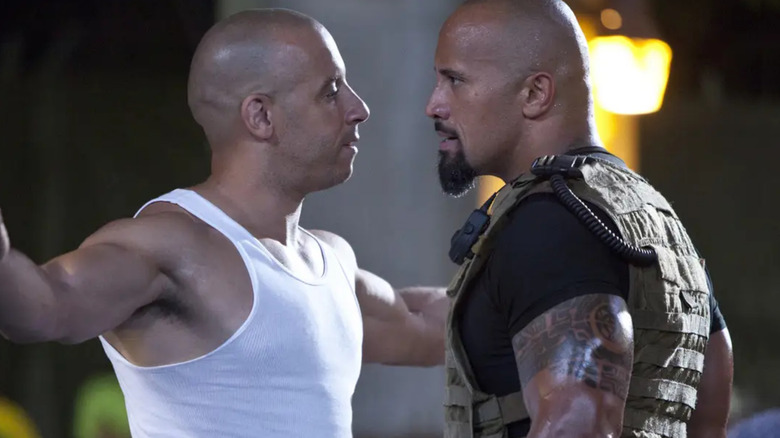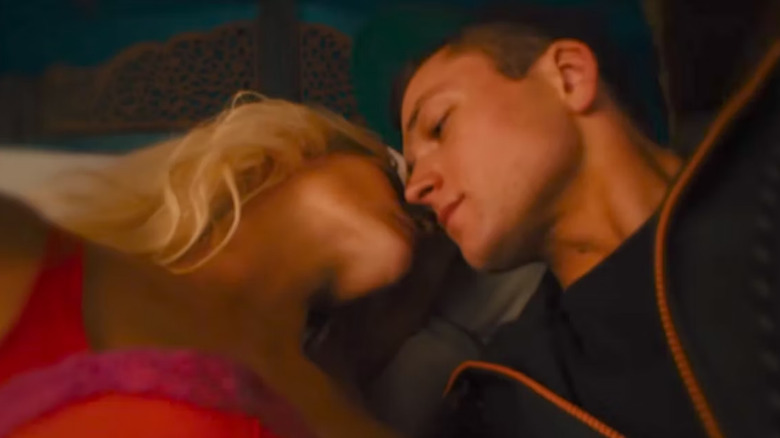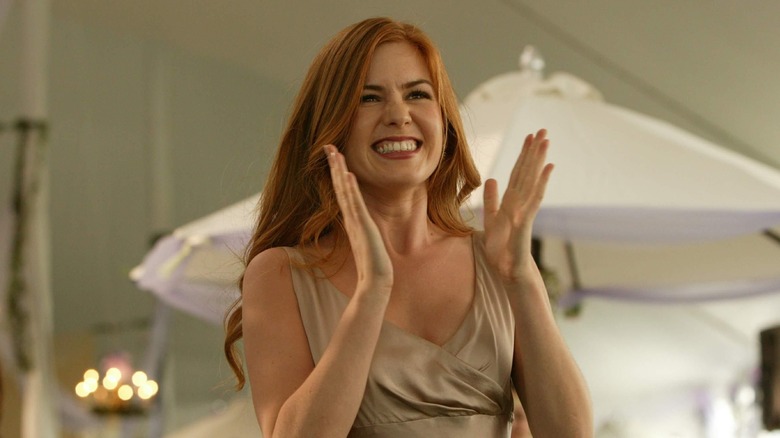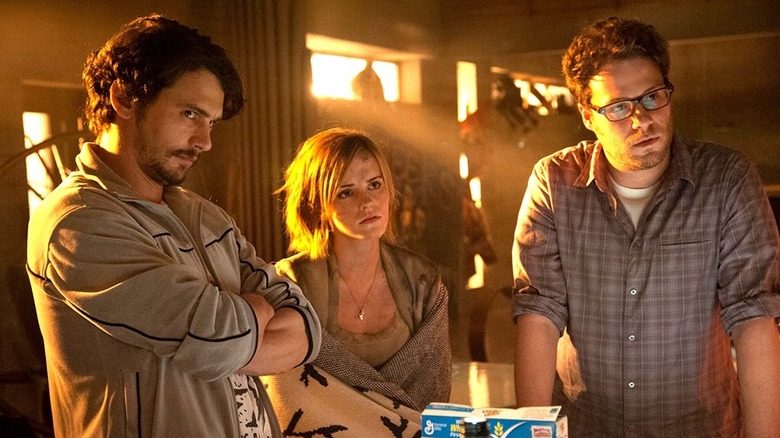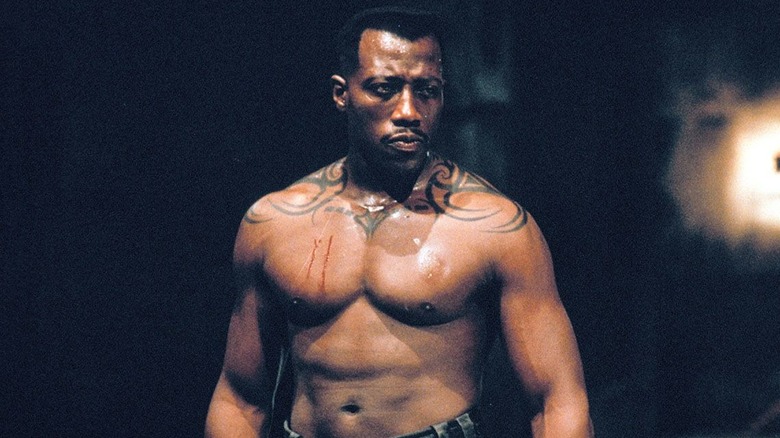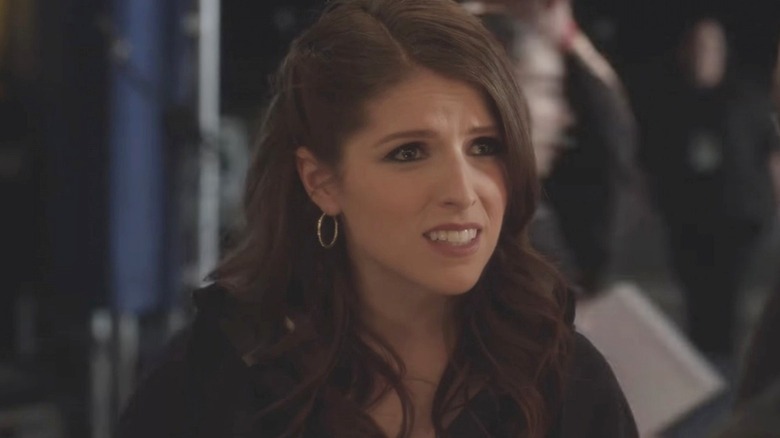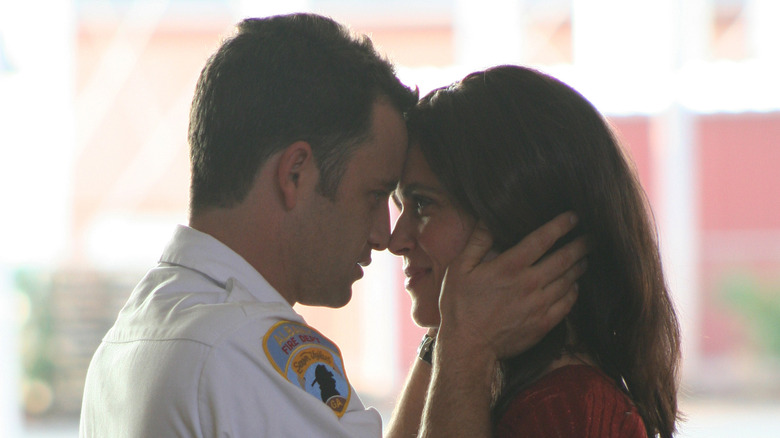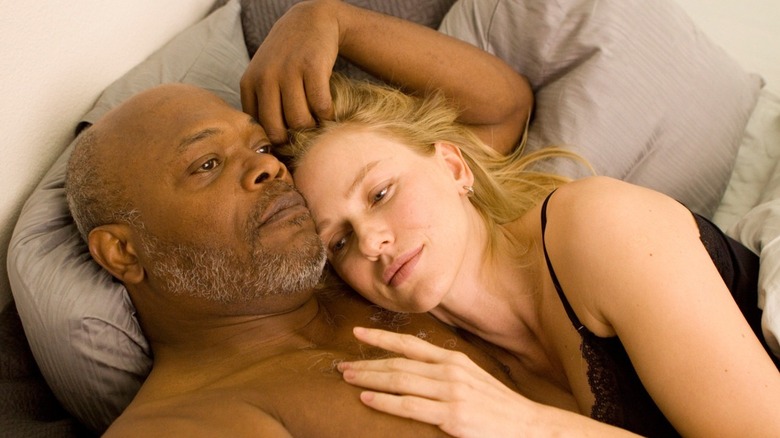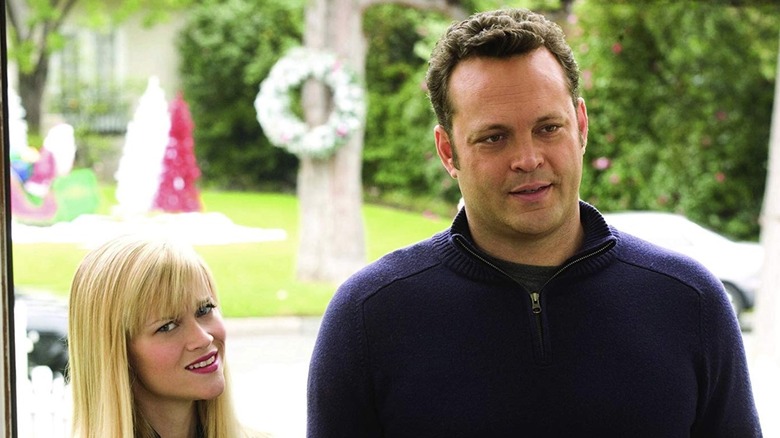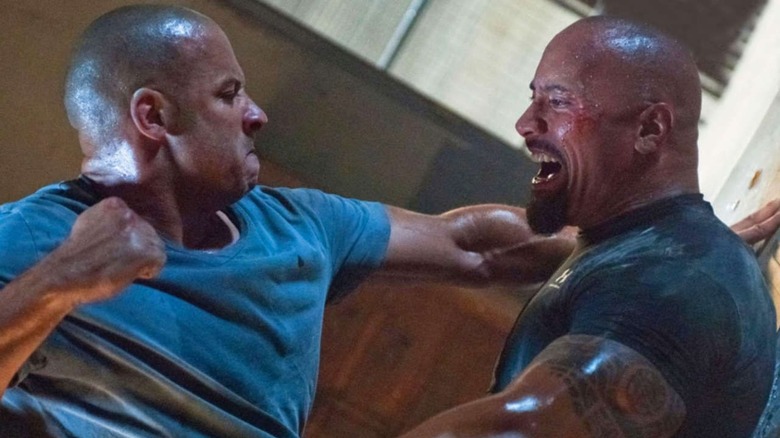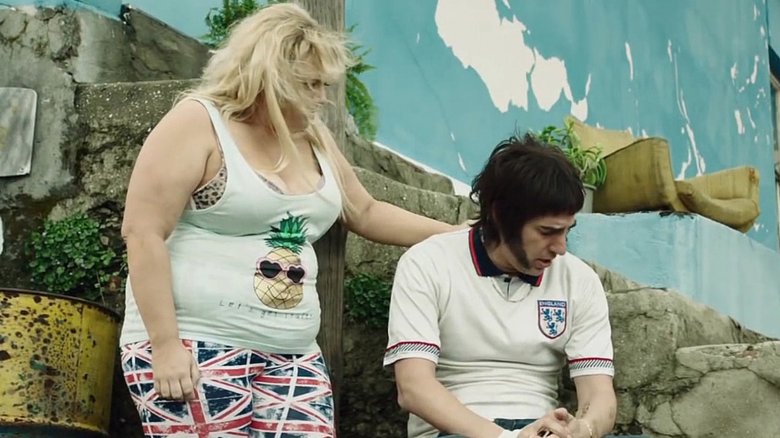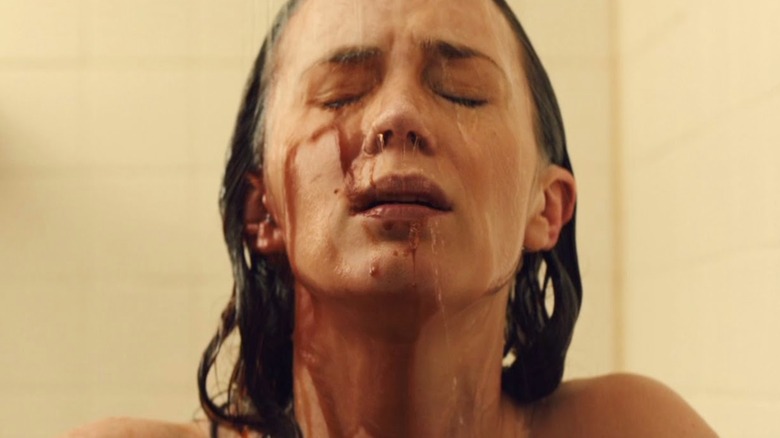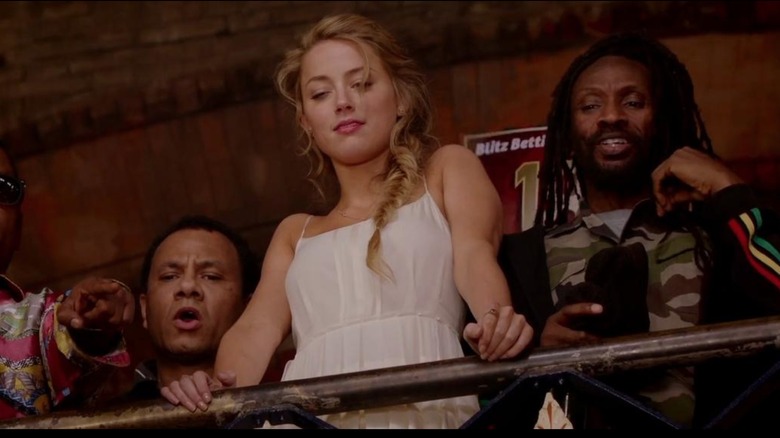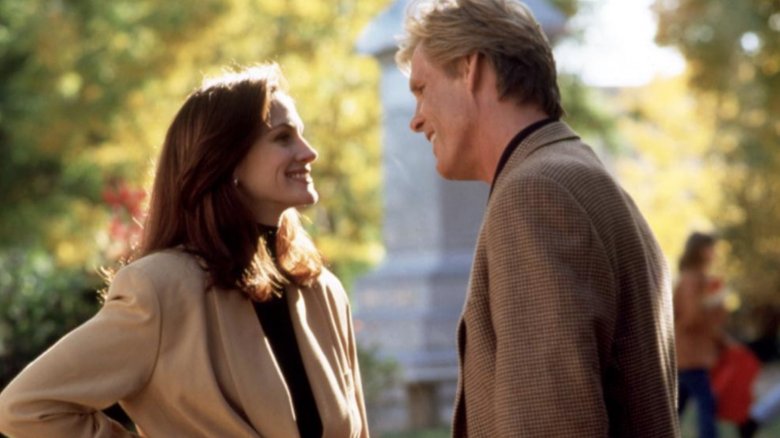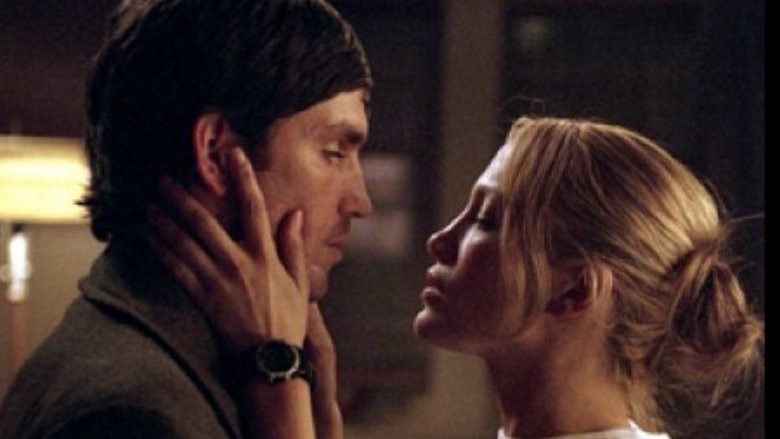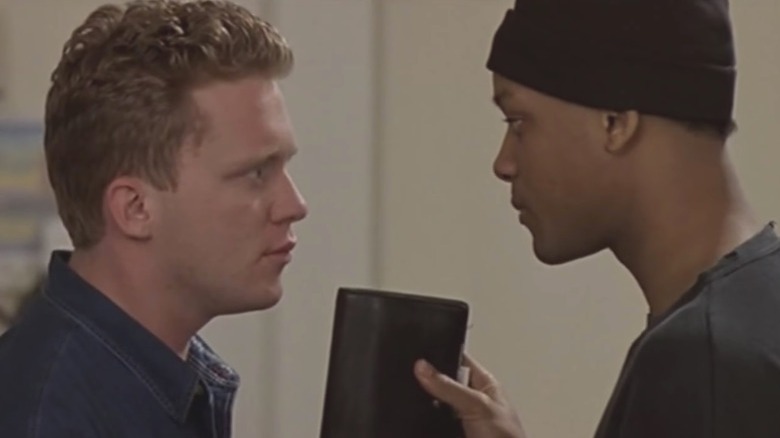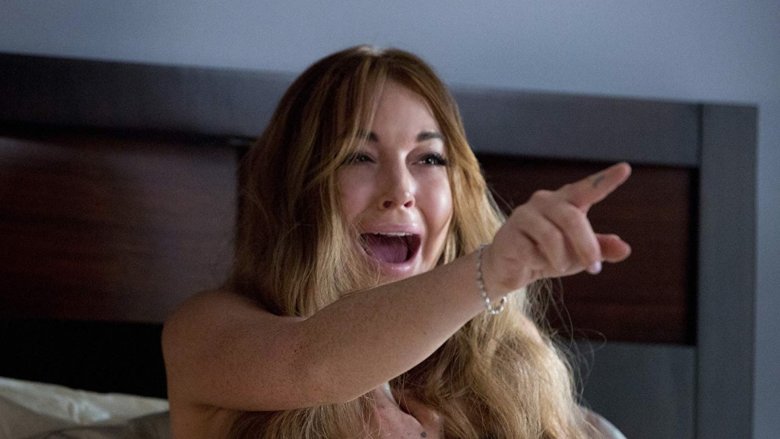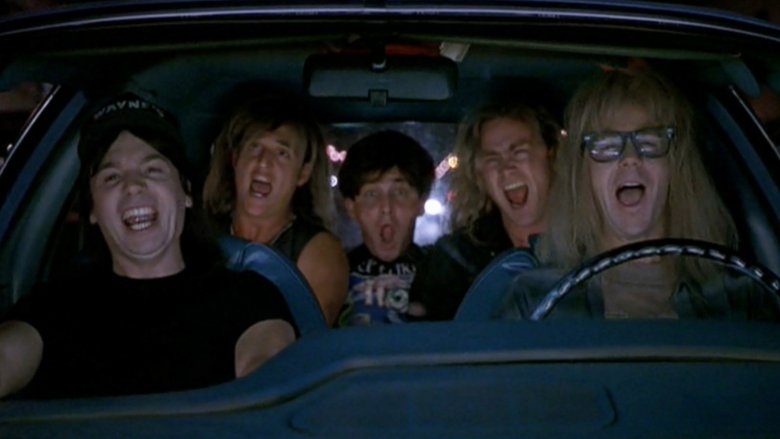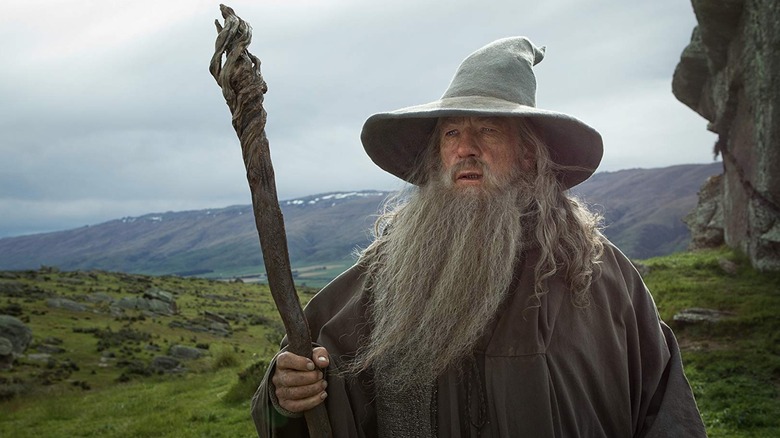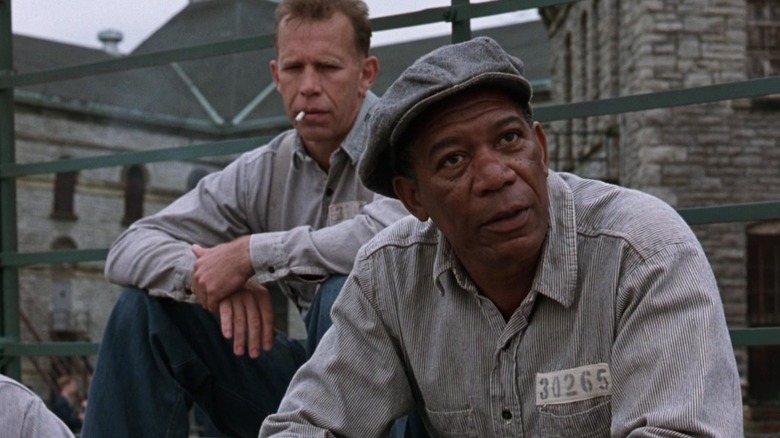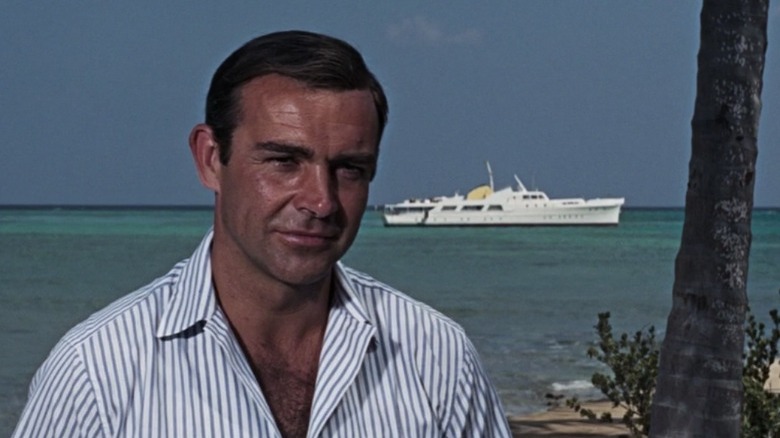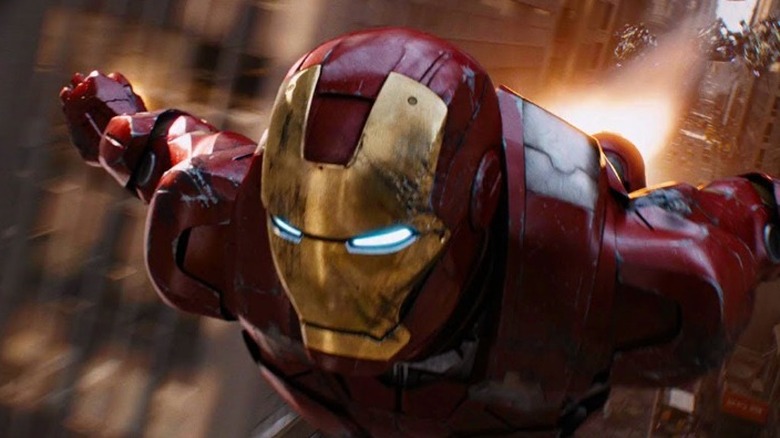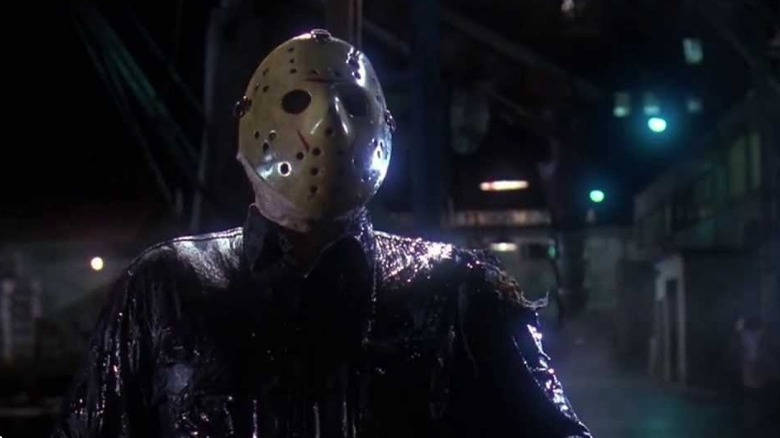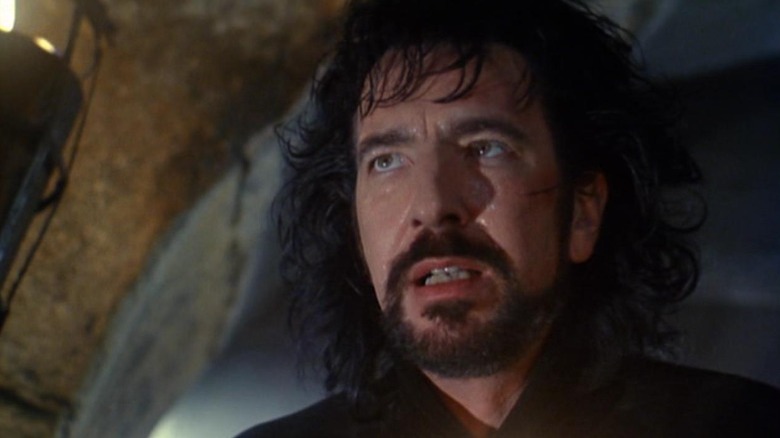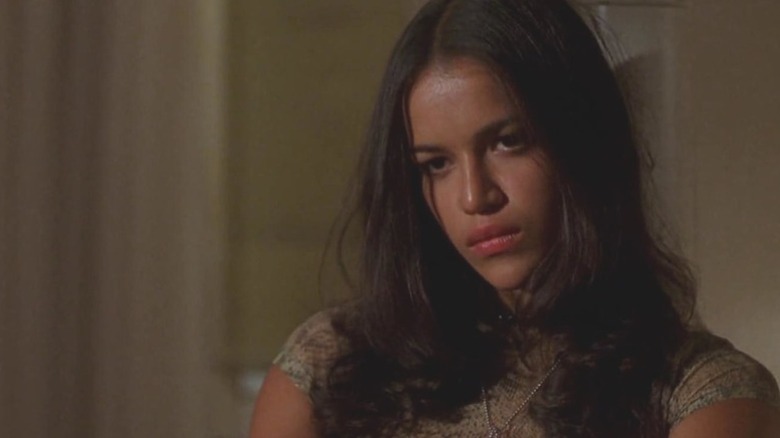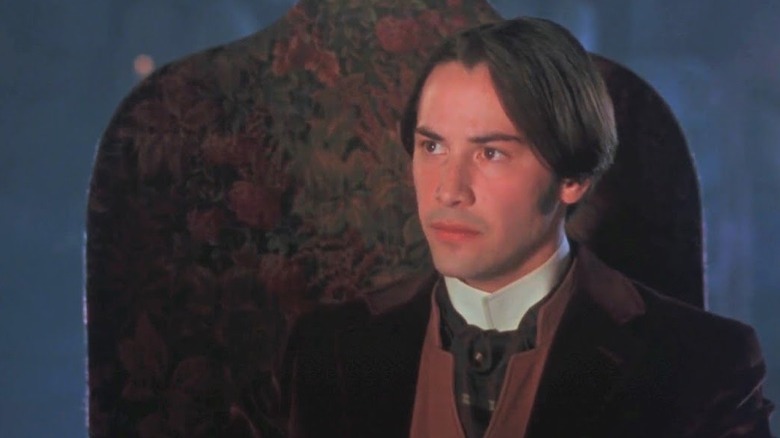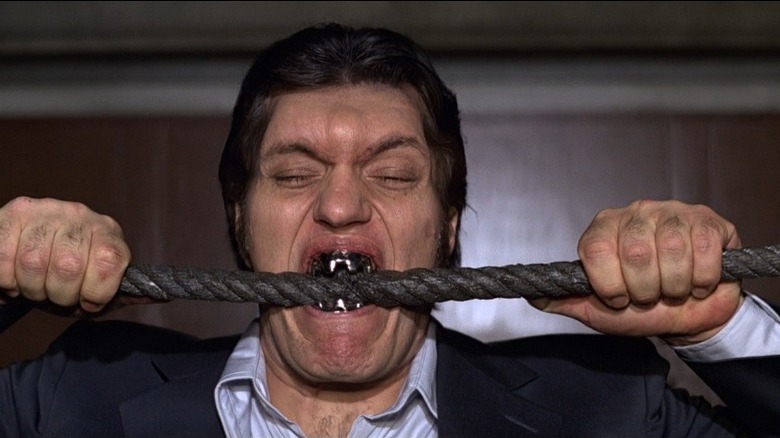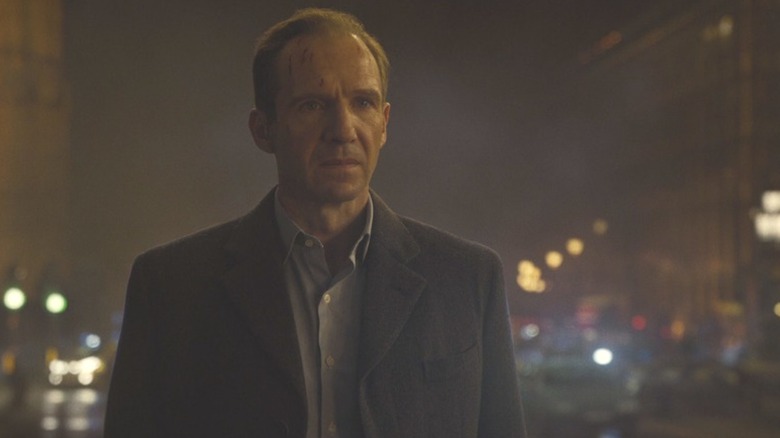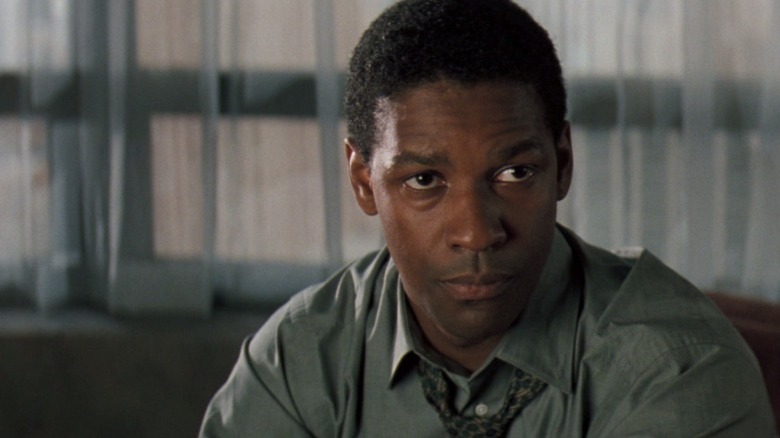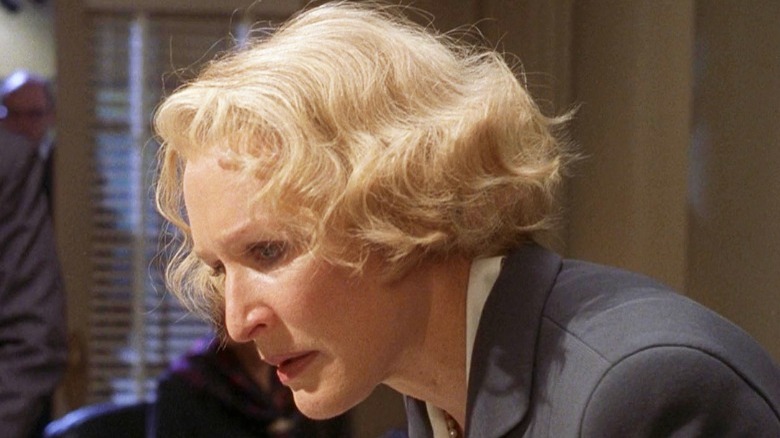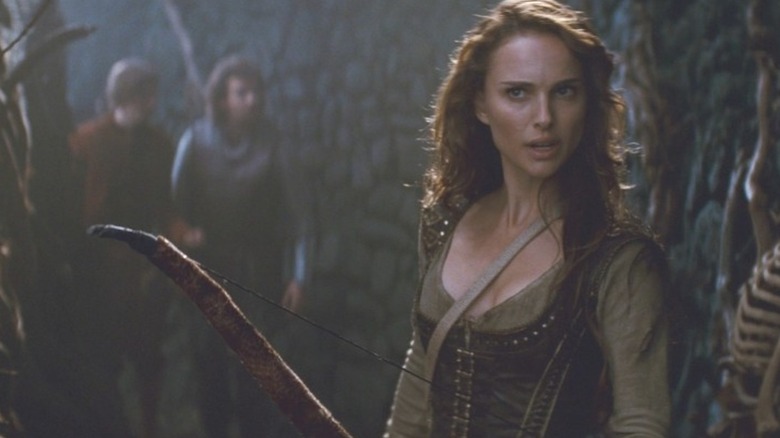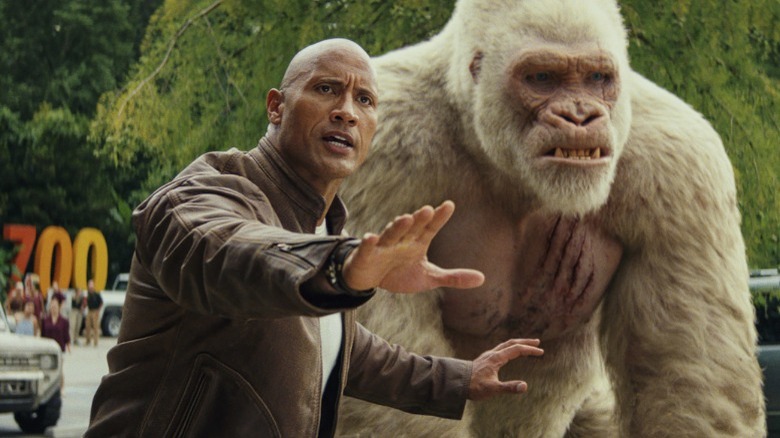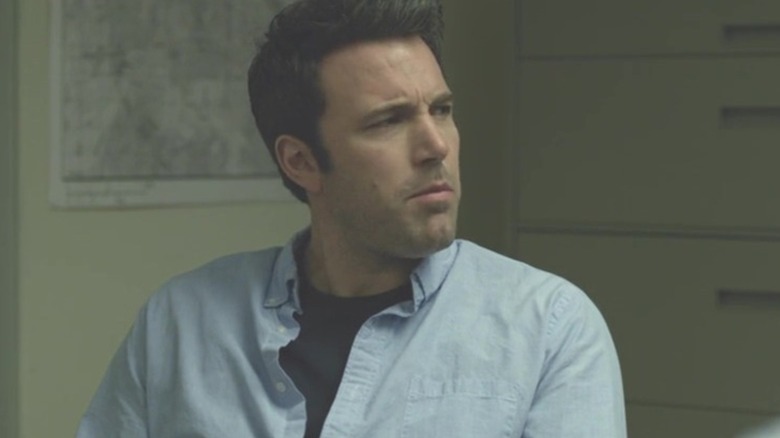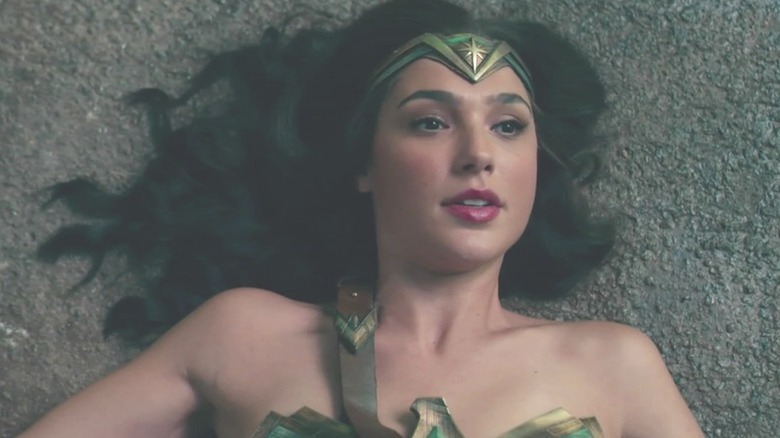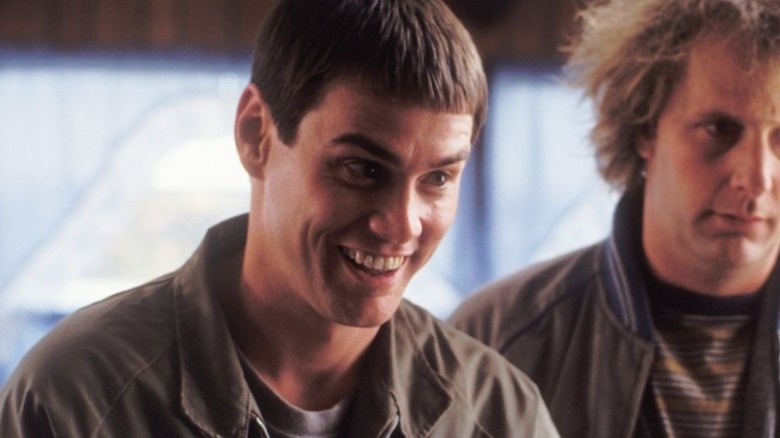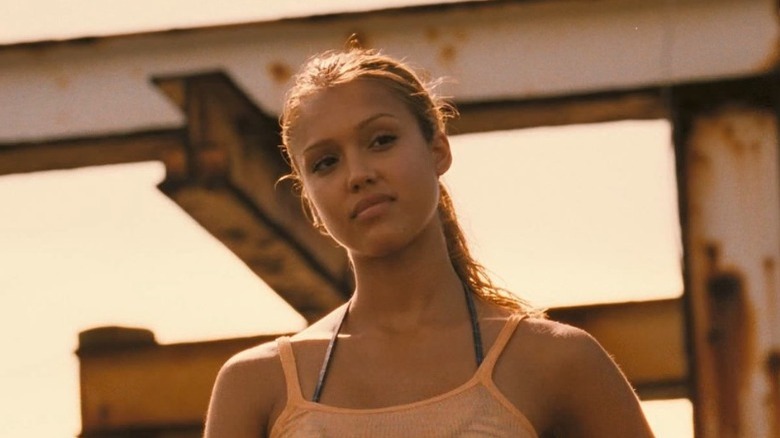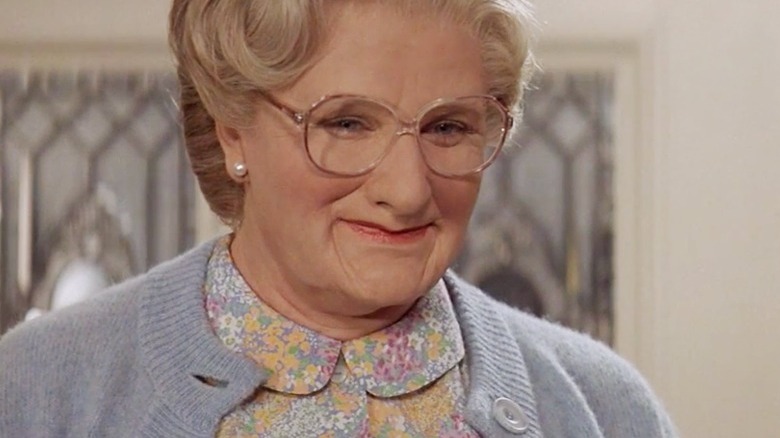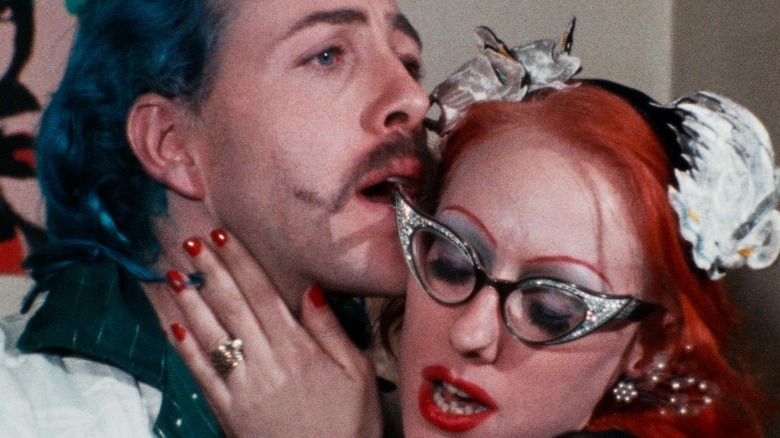Movie Scenes Actors Refused To Film
Red carpets, private jets, second homes in exotic locales — the life of an actor may seem pretty plush. But don't forget that being an actor requires work, and it isn't your typical 9 to 5. Showing up for a day means long hours on set, demanding directors, uncooperative co-stars, and — of course — egos coming at you from every angle. And sometimes the script (aka the blueprint of the actor's job) has something in it that A-listers just aren't willing to do for fear of harming their reputation or crossing personal boundaries.
When things go too far and a star declines to do a scene, rumors swirl and often leak, leading fans to speculate as to what kind of drama went down on set. But sometimes actors are candid about how their own beliefs and values conflict with their profession of choice. From nudes to feuds, here's a look at movie scenes that actors refused to film.
Taron Egerton's hands-off attitude
As Eggsy in the "Kingsman" series, Taron Egerton skyrocketed from a relative unknown to totally in-demand leading man. But a steamy scene with Poppy Delevingne in the second installment of the spy franchise, "Kingsman: The Golden Circle," was too hot for him to handle.
Egerton's Eggsy, already conflicted about engaging in a honeypot mission with Delevingne's Clara as his target, is under pressure to place a tracking device inside her body during an intimate moment. In an interview with ScreenRant, Egerton described his apprehension, recalling, "It was a day that I was anxious about ... The way it was described in the script it was like 'I'm going to do what?'" Luckily, on the day of shooting, Egerton saw his way out after realizing director Matthew Vaughn wanted to shoot the up-close-and-personal scene from a POV angle. Egerton confessed, "I said to Matthew 'I'm not comfortable doing this'. So it's not my hand — it's Poppy [Delevingne]'s husband's hand. He saved the world."
The director defended his choice in an interview with Uproxx, saying "I wanted to see a spy with an emotional and moral dilemma of having to do something he really doesn't want to do ... Some people laugh and cheer. Other people are like, "Oh my God." Some people are disgusted about it. But nobody doesn't notice it — and, afterwards, they'll talk about it."
Isla Fisher's double vision
Isla Fisher's breakthrough role as "stage-5 clinger" Gloria Cleary in 2005's "Wedding Crashers" catapulted her to fame — and earned her a reputation as a comedic force. The film was a huge hit at the box office, thanks in part to raunchy R-rated gags, including 54-year-old Jane Seymour casting off her robe for her first-ever nude scene. But as far as Fisher was concerned, nude scenes were an absolute dealbreaker. In an interview with Hello magazine shortly after the movie premiered, she said, "I totally hate the puritanical approach to the whole nudity thing, but then when it comes to me I have double standards."
In a later interview with Entertainment Weekly, she elaborated on just how many scenes she skipped ... and how many stand-ins her shooting contract stipulated. "I had a hand double for the under-the-table scene. I had a breast double for the boob-in-the-face and I had a butt double," she said. "My argument was, if you see a character's breast, she's no longer funny. You see her as someone sexual rather than as someone funny. I lost that argument with the producers."
Fisher further explained how that conflict influenced her performance as sweet and lovable, yet ultimately conniving Gloria. "I amped up the reality of my character even more," she told EW. "I thought, to combat the fact that you're going to see her boobs, I have to make her even more extreme for us to still get a laugh."
This was the end for Emma Watson
Emma Watson has demonstrated serious range in a variety of roles since breaking through as a child actor in the "Harry Potter" films. But none of it prepared her for her uncomfortable cameo in "This Is the End." Like the rest of the dark comedy's all-star cast (including co-writer/director Seth Rogen, Jonah Hill, Danny McBride, and James Franco), Watson played an exaggerated version of herself — but she didn't exactly feel welcome in the boys' club atmosphere during filming.
According to an extra, Watson walked off the set over a scene featuring Channing Tatum in a surprise cameo, doing the full-on Magic Mike. PopFocal picked up the since-deleted blog post, which alleged, "Channing decided to do some of his breakdancing in front of her but alas he was in nothing but a thong ... Emma storms off set ... So we wrapped the night 5 minutes later."
James Franco seemed to confirm the story to Interview magazine. "The movie is a comedy, but it's kind of an outrageous one, and this actress — I won't say who, but she had a smaller role in the film — walked off the movie in the middle of a scene," he said, adding, "What was going on around her was, I guess, too extreme for her." Watson herself has never commented on the alleged kerfuffle.
Wesley Snipes was an absentee Blade
The final installment of the "Blade" trilogy, "Blade: Trinity," didn't exactly wow audiences when it premiered in 2004. Panned by critics as being shallow and scattered, it left fans disappointed and confused — especially after Snipes filed a lawsuit against the production company after the film's release.
Eight years after the film came out, cast member Patton Oswalt shed some light on what went down — namely that Snipes was barely around. Calling him "crazy in a hilarious way," Oswalt told the A.V. Club, "He wouldn't come out of his trailer, and he would smoke weed all day ... he only [came to the set] for close-ups. Everything else was done by his stand-in. I only did one scene with him."
Oswalt also revealed that Snipes had big beef with writer-director David Goyer, stemming from an argument during a night out in Vancouver while filming. "Wesley sat down with David and was like, 'I think you need to quit. You're detrimental to this movie,'" he recalled. "And David was like, 'Why don't you quit? We've got all your close-ups, and we could shoot the rest with your stand-in.' And that freaked Wesley out so much that, for the rest of the production, he would only communicate with the director through Post-it notes. And he would sign each Post-it note 'From Blade.'"
Anna Kendrick did not like this pitch
Anna Kendrick found international superstardom in "Pitch Perfect" as Beca, The Bellas' rebellious soprano with a steel will and a heart of gold — and it sounds like her real-life personality isn't far from the tough-talking undergrad she played on the big screen. Kendrick put her foot down on a potential storyline that had Beca getting romantically involved with a record executive who was trying to get the Bellas' master of the mash-up to sign with his label.
"Originally the music executive was supposed to be my romantic interest but I said no to that, because I thought that would be kind of f***ing problematic," she told Harper's Bazaar UK. "I was like, 'Can no one else [see it]?' Once I said it, everybody was like, 'I guess so.' And they still wanted to have a version at the end when we kissed, and I still said no."
In the same interview, Kendrick revealed that she pushed back on producers who asked the Bellas to step into sexier wardrobes. "It's funny," she said. "Whenever we do the wardrobe fittings I feel like we get notes from the top saying they should be tighter and sexier and show more skin. And I'm like, that's not why people are coming to see the movie. They definitely aren't showing up because of our sex appeal ... It's nice that audiences are interested in seeing a movie of misfits and girls of different shapes and sizes."
Kirk Cameron: from Growing Pains to kissing pains
Kirk Cameron's strict Christian faith means that he considers even the smallest onscreen romantic gesture to be risqué — which is why he told producers of the 2008 faith-based family drama "Fireproof" that he wouldn't be kissing his co-star.
As Cameron claimed during an appearance on the Today Show, it wasn't just the kiss — he clashed with producers over several storylines he felt were immoral, mainly that his firefighter character spends much of the film contemplating divorce. "The reason this movie was important to me personally is because I love my wife dearly," he said. "In a day and age where marriage is falling apart, we want to make movies and projects that really uphold and have a high view of that which is beautiful and wonderful in our culture."
That commitment to marriage meant that kissing his co-star was out of question. Luckily, the film crew was able to make it work with some low lighting, tight angles, and a very special co-star. Chelsea Noble, Cameron's wife, was dressed up in the female lead's costume and shot in silhouette. "When I'm kissing my wife, we're actually husband and wife honoring marriage behind the scenes," said Cameron of the finished product.
Samuel L. Jackson isn't big on nude scenes
Samuel L. Jackson has never been one to shy away from violence or vulgarity onscreen — after all, he's made six movies with Hollywood's king of expletives, Quentin Tarantino. In his prolific career, Jackson's cleaned brains out of the back seat of a Chevy Nova, been eaten by dinosaurs, and tangled with a plane full of snakes. But there's one thing that scares this fearless actor — dropping trou on camera.
In a raunchy interview with — who else? — Howard Stern, Jackson revealed that it isn't modesty but self-confidence that's kept him from stripping for the camera. "I don't know if it's formidable enough," he admitted in reference to his genitalia. "My aura's so big, I don't know if [it's] big enough to fill my aura."
He also expressed his discomfort regarding the "extremely awkward" process of filming sex scenes in general, and explained why he's only agreed to strip down a handful of times in his 50-year career, including with Juliette Binoche for "In My Country" and Naomi Watts in "Mother And Child." "You ask before you start, 'Where can I touch you? Where shouldn't I touch you?'" he explained to Stern. "Then you apologize for both reasons. 'I'm sorry if I get excited' and 'I'm sorry if I don't.' Because sometimes it just ain't happening!"
Reese won't play nice or get naughty with Vince
Back in 2008, "Four Christmases" sounded like the best idea since Christmas tree cakes and rum-spiked eggnog. Put America's sweetheart Reese Witherspoon and America's favorite funnyman Vince Vaughn together as a couple that's forced to spend Christmas with their disapproving, divorced relatives. Hilarious holiday hijinks ensue! While the movie brought in a bundle, the reviews were abysmal, with many critics panning the lack of chemistry between the leads. Oh, if only they knew.
It was a Christmas miracle the film got finished at all, given that Witherspoon and Vaughn couldn't stand each other. Honestly, these two not getting along shouldn't have surprised anybody. She arrived bright and early to the set; he would wander in looking like he partied the night before. She wanted to rehearse and block scenes; he wanted to ad-lib. Their relationship grew so cold that Reese is reported to have refused a sex scene with Vaughn. After pushing back, she got her wish — the scene was scrapped.
Isn't it nice when fake movie couples bicker and fight as much as real-life ones? Ah, the power of love.
Dwayne Johnson and Vin Diesel were furious, all right
Production on the eighth installment of the "Fast and Furious" franchise, "The Fate of The Furious," was less than full-speed ahead thanks to the competing egos of two of the franchise's biggest stars — Dwayne Johnson (who joined the franchise in "Fast Five" as bounty hunter Luke Hobbs) and Vin Diesel (car thief Dom Toretto). In fact, it was ultimately revealed that the beef was so bad, the two totally refused to film together.
It all started in 2016, when Johnson wrote in a since-deleted Instagram post, "Some [men] conduct themselves as stand-up men and true professionals, while others don't. The ones that don't are too chicken s*** to do anything about it anyway. Candy asses." Johnson and Diesel reportedly had a hush-hush meeting the next day — which pretty much confirmed that Diesel was the subject of Johnson's anger. The tension allegedly stemmed from decisions Diesel made as a producer that didn't sit well with the former People's Champ. Sources reported that things were so uncomfortable on set that it was "impossible to shoot scenes."
In a 2018 interview with Rolling Stone, Johnson himself confirmed that his scenes with Diesel in "The Fate of The Furious" were the product of clever post-production work. "We were not in any scenes together," he said, adding, "What I came to realize is that we have a fundamental difference in philosophies on how we approach moviemaking and collaborating." It seems, however, that those differences have been put aside, with Hobbs returning for "Fast 11."
Wilson rebels against going nude
If you've ever seen "Borat," "Bruno," or basically any of Sacha Baron Cohen's work, you know the dude has zero issues with filming in his birthday suit ... or with doing anything in poor taste, for that matter. So it's no surprise that he expects the same nonchalance about nudity from his co-stars, but one of his famous female scene partners flat-out refused to go nude, despite Borat's badgering.
Rebel Wilson is known for her bawdy, anything-goes brand of humor. As ribald as Rebel is, she does draw the line when it comes to dropping her drawers. She refuses to go nude and has it written into her contract that her clothes stay on. In 2016's "The Brothers Grimsby," Wilson played the girlfriend of Cohen's screw-up turned spy character, and one scene called for full-frontal nudity. Despite having a body double — a South African burlesque dancer — Cohen wanted Wilson to be the one to bare all.
"Sacha would go, 'See, she looks good.'" Wilson recalled to Metro. "I'm like, 'I'm not doing it. I don't care what you say.'" Wilson won the battle, not that many people would have seen her naked anyway. "The Brothers Grimsby" earned an atrocious $25 million total at the worldwide box office, or less than what "Borat" made in one weekend.
Emily is blunt about not going topless
While Rebel Wilson was badgered by her famous co-star for refusing to go nude, Emily Blunt was supported by hers ... as well as her breasts, evidently.
In 2015's super-scary suspense film "Sicario," Blunt plays an FBI agent batting drug cartels along the Mexican border. A scene called for Blunt to go topless. While the scene was written in the script, Blunt later told interviewer Howard Stern (via The Independent) that when it came time to film, she — and her breasts, apparently — refused. "It was in there originally, but it came out because we didn't agree with it," Blunt said. She clarified that "we" meant "my t**s."
Blunt was backed up by co-star Benicio del Toro, who agreed that the scene wasn't necessary. Given that del Toro played the "sicario" of the title (Mexican slang for "hitman"), nobody wanted to mess with him. Plus he's just really intimidating and making him angry wouldn't turn out well (just watch the diner scene in "Fear and Loathing In Las Vegas").
Amber Heard gets sued for not going nude
Amber Heard has gone nude on film before, but when it came time to go topless for 2018's "London Fields," she flat-out refused — and consequently was sued by the producers.
Based on Martin Amis' 1989 novel of the same name, the film stars Heard as Nicola Six, a clairvoyant femme fatale who predicts she will be murdered by one of her three lovers. Given that both the script and the novel it was based on were, according to the lawsuit (via The Wrap), "salacious, provocative and contained nude scenes," producers argued that Heard was well aware she'd be asked to go nude. She still refused, meaning that "key scenes in the script had to be removed and/or rewritten to accommodate Heard's behavior."
Producers also argued that Heard didn't just disrupt the production, but also damaged the film's publicity. They alleged that Heard was contractually obligated to attend the premiere at the Toronto International Film Festival (which she did not), and that she even tried to get the film pulled from TIFF's lineup (which it was). The production company, Nicola Six Limited, sued Heard for $10 million, or about 40 times what it made at the domestic box office when it was finally released three years after it was pulled from Toronto. Its $250,000 take makes it one of the biggest bombs in history.
Julia Roberts loves trouble but hates Nick Nolte
The 1994 romantic comedy "I Love Trouble" is most remembered these days for inspiring one of the most notorious co-star feuds ever. Julia Roberts and Nick Nolte star as dueling Chicago reporters chasing the same scoop, as murder, mayhem and romance ensue. Filmmakers were hoping for a Tracy-Hepburn spark, but what they got was a Nolte-Roberts dumpster fire.
Rumor has it Roberts so disliked Nolte's loutish machismo that she would insult him on set. Nolte grew so tired of her tantrums, he'd act up just to spite her. It got so bad the two refused to film their scenes together and acted with stand-ins instead. Roberts and Nolte played nice during promotion, but proving that time does not heal all wounds, they continued to hold a grudge years later.
The gloves came off in 2003 when Roberts called Nolte a "disgusting" human being. Nolte responded, "It's not nice to call someone 'disgusting.' But she's not a nice person. Everyone knows that." Roberts also referenced a foul-mouthed, temperamental co-star in a 2009 "Late Show" appearance, and we don't think she was referring to Richard Gere. Nick Nolte has been nominated for an Academy Award three times, while Julia Roberts won one for 2000's "Erin Brockovich." Sounds like both of them deserved an Oscar for even briefly pretending to like each other.
Jim Caviezel only has Angel Eyes for his wife
Jim Caviezel became a household name, if not a Hollywood A-lister, for his role as Jesus Christ in Mel Gibson's 2003 passion project "The Passion of the Christ." Before going Biblical, he was well on his way to being the next big blockbuster heartthrob with parts in "Frequency," "The Count of Monte Cristo," and "Angel Eyes." It was in the latter two that the devout Catholic earned his reputation for refusing explicit sex scenes.
Tinseltown is a tough place for chastity, and Caviezel raised eyebrows when he wouldn't do a love scene with Jennifer Lopez in "Angel Eyes" —unless she kept her clothes on. He likewise refused to film a sex scene with his "Monte Cristo" co-star Dagmara Domińczyk unless she put something between her breasts and his chest. She wound up taking flesh-colored underwear and fashioning pasties from it.
Caviezel has argued that his commitment to staying clothed is out of respect for his wife and his Catholic faith. "If it is embarrassing for people on set," he told The Independent. "If they think you're a wimp, that you're an embarrassment, talking this way — well, I'd rather be embarrassed before the whole country than before God."
The Fresh Prince refuses to French kiss a man
Will Smith was riding high in the early 1990s with a successful hip-hop career as the Fresh Prince and an even more successful TV show, "The Fresh Prince of Bel Air." Before discovering his later penchant for making broadly appealing blockbuster movies, Smith sought to establish himself as serious actor right out of the gate with 1993's "Six Degrees of Separation." Based on the play of the same name, the movie has a dense, character-driven plot and complicated themes — and while Smith was willing, even eager, to take a risk, the script called for something he refused to do.
In the film, Smith's gay character is required to share a passionate kiss with his male co-star, Anthony Michael Hall. Smith was uncomfortable with this and sought advice from Denzel Washington, who supposedly told him not to kiss a man on camera. So that's precisely what Smith didn't do: The shot was filmed from behind, allowing Smith to fake it.
By keeping several degrees of separation from his male co-star, Smith started a pattern of strategically avoiding controversial roles. Until the 2022 incident in which Smith slapped Chris Rock onstage at the Oscars, it certainly didn't hurt his box office tally, which amounts to roughly $9.6 billion in worldwide grosses.
Lindsay Lohan gives Charlie Sheen the cold (sore) shoulder
As anyone who ever followed Charlie Sheen's Twitter account can attest, the dude has a colorful mouth. Perhaps his penchant for drinking tiger's blood was too much for Lindsay Lohan.
In the 2013 horror spoof sequel "Scary Movie 5," Lohan was supposed to kiss Sheen three times in their bedroom scene. However, Lohan refused to lock lips with Sheen out of fear of germs (or worse) from his hard-partying past. Both stars had already signed releases saying that they didn't have cold sores, but even with contractual assurances, Lohan still refused to smooch. While filmmakers tried to use a body double, they ultimately just dropped most of the kissing from the scene entirely.
The lack of mouth-to-mouth didn't hurt the film (it made a respectable, if underwhelming, $72 million worldwide on a $20 million budget) and it didn't damage Sheen and Lohan's relationship, either. He reportedly gave her $100,000 to help pay off her taxes. With that handout, it's clear that the "Scary Movie 5" co-stars didn't need to kiss and make up ... although they eventually did lock lips on an episode of Sheen's "Anger Management" TV show.
Mike Myers saves Wayne's most famous scene
When it comes to being difficult, Mike Myers has earned mythic status. However, for all of his diva-like demands, a lot of Myers' stubbornness is actually for the betterment of the movie. Case in point: making Shrek Scottish in the middle of production cost DreamWorks millions of dollars, but was the right call. But there's no better example of Myers making artistic demands than this story about the most famous scene in "Wayne's World."
If you think of "Wayne's World," you probably think of Wayne, Garth and the gang headbanging and lip-synching to Queen's "Bohemian Rhapsody," right? According to Myers, it almost wasn't Queen's masterpiece they sang to, but a Guns N' Roses tune. Fortunately, he stuck to his guns and refused to film the scene unless it was "Bohemian Rhapsody." He even threatened to walk away from the film, which would have been difficult, given Wayne Campbell was his "SNL" character. Despite it being his first movie, Myers got his way, saving the now iconic scene and establishing a reputation that follows him to this day.
The desolation - and isolation - of Ian McKellen
Ian McKellen is a consummate professional, so when the classically trained British thespian of stage and screen is upset, something's wrong. A widely admired actor for decades, he didn't garner movie star status (and the salary it commanded) until playing Gandalf in Peter Jackson's "The Lord of the Rings" trilogy in the early 2000s. It's no surprise he jumped at the chance to reprise his role in 2012's "The Hobbit."
As they say, be careful what you wish for (especially if you're a wizard). While the filmmakers had employed an in-camera technique known as "forced perspective" to make Gandalf larger than the hobbits in the "Rings" movies, they used a green screen for "The Hobbit." McKellen, who delights in performing with other actors, was now by himself in a sea of green. "It's not what I do for a living," McKellen told The Guardian of the experience. "I act with other people, I don't act on my own."
It was pretty soul-crushing, so much so McKellen didn't simply refuse to film a scene — he nearly refused to continue his acting career. Sensing McKellen's misery, Jackson used some magic of his own, convincing him to stay and even staging an impromptu "Gandalf Appreciation Day." It apparently worked.
Morgan Freeman thought one Shawshank Redemption scene was too cheesy
"The Shawshank Redemption" is considered one of the greatest films ever made, even though it was far from a box office success when it first hit cinema screens in 1994. Based on a 1982 Stephen King novella, the Frank Darabont-directed film stars Tim Robbins as a wrongly incarcerated prisoner who develops a strong friendship with Morgan Freeman's convict character Red. The film further cemented Freeman's reputation as a dramatic actor, but the actor also demonstrated that he was unwilling to compromise on quality.
The ending of "The Shawshank Redemption" sees Andy Dufresne finally escape from prison following a decades-long scheme. Red is later released on parole and, after struggling to live an everyday life outside of his cell, decides to meet up with Andy in the Mexican village of Zihuatanejo. In the final moments, the two friends see each other on a beach and embrace as the camera pans away.
Freeman later revealed that director and writer Frank Darabont wanted a slightly different ending. Speaking to the Daily News, Freeman explained how the script initially had Red blowing Andy's old harmonica before they met on the beach. However, the actor thought this was "sort of asinine, sort of cliched, sort of unnecessary and overkill," and simply refused. Morgan was able to convince Darabont to have a more straightforward and impactful reunion instead.
Sean Connery didn't want to mess with sharks
Although there has been a lot of debate about which actor was the best James Bond, Sean Connery consistently ranks highly. Connery was the first actor to play the character on the big screen and set a precedent that all others would be judged by with his effortless portrayal of the British spy. In total, the actor played 007 in a total of six films produced by Eon Productions plus the unofficial "Never Say Never Again" in 1983. During that time, Connery's character faced numerous challenges and dangers, but one proved too much for the Scottish actor.
During filming for "Thunderball," Connery — along with several other actors and stunt performers — was required to go into a pool filled with sharks. Not particularly thrilled with the idea of swimming with sharks, Connery demanded changes to the scene before he got in the water, including the installation of a plexiglass shield to separate him from the live animals. But there wasn't enough plexiglass, which allowed the sharks to reach the actor, who made a swift exit and decided not to get back in the pool.
The episode may also have led to his nervousness at having to scuba dive with sharks for "Never Say Never Again" some years later, with Connery saying: "The underwater stuff, I'm not very good at it, and was very, very nervous about going under."
Robert Downey Jr. needed a line change
While the Marvel Cinematic Universe is undoubtedly an ensemble effort filled with a huge cast of characters, there is one man who could be considered the face of the franchise. Robert Downey Jr.'s Iron Man not only started the entire series but played a massive role in establishing it as a success. Having appeared in nine MCU movies, Iron Man was a regular part of the narrative before his death during the events of "Avengers: Endgame."
This made Downey Jr. an important figure who not only earned a ton of money through a lucrative deal but also held a great deal of influence in terms of filmmaking. One of the times that the actor used this sway was at the end of the 2012 film "The Avengers." Having helped stop Loki and prevent the destruction of New York, Iron Man is left tumbling through the sky before crashing into the Hulk. He awakens, surrounded by his fellow heroes, and was initially supposed to say, "What's next?"
But Downey Jr. was apparently unhappy with this line and worked with Joss Whedon to come up with an alternative. This eventually led to a joke where Iron Man tells the rest of the Avengers that they need to go to a shawarma restaurant nearby before getting back to work, which itself prompted Whedon to include a post-credits scene depicting that very thing.
Kane Hodder wouldn't hurt animals as Jason Voorhees
The "Friday the 13th" franchise has become one of the longest-running and most successful horror series in history. In 1989, Rob Hedden wrote and directed "Friday the 13th Part VIII: Jason Takes Manhattan," in which Kane Hodder reprised his role as the serial killer Jason Voorhees. In this installment, Jason follows a group of teenagers heading to New York City via boat, targeting them as part of his murderous schemes.
As a horror villain, Jason has never been afraid of getting his hands dirty and has dispatched plenty of victims with the kind of barbarity you'd expect from a senseless killer. But there was one thing that he — or at least actor Hodder — was unwilling to do. As part of his arrival in Manhattan, the script had Jason kicking a helpless dog he encountered on the shore. Hodder apparently refused point blank the very idea of performing the scene, telling the director that even his character wouldn't be sadistic enough to hurt an animal. So the script was altered to remove the offending scene, leaving Jason free to add to his already impressive human kill count.
Alan Rickman got his way as the Sheriff
"Robin Hood: Prince of Thieves" offers a lot to viewers, whether it's that dodgy accent from Kevin Costner, the Bryan Adams ballad "(Everything I Do) I Do It for You," or the performance of Morgan Freeman as Azeem Edin Bashir Al Bakir. However, the best part of the movie is undoubtedly Alan Rickman as the villainous Sheriff of Nottingham, showcasing just how wonderful he was at portraying evil characters and winning him a BAFTA in the process.
Yet Rickman was not exactly sold on the project when he read the script. He admitted in 2015 that he had no intention of reading the dialogue that was written on the pages he was given and secretly arranged to punch up certain scenes to make his character more memorable. He did so with the help of two of his friends, comedian and actor Ruby Wax and playwright Peter Barnes.
The group, working from a Pizza Express restaurant, eventually managed to create a funny moment where the Sheriff solicits two women to come up to his bedroom, with director Kevin Reynolds agreeing to incorporate them into the movie. The plan worked and helped make Rickman's performance one of the standouts in the film.
Michelle Rodriguez was furious she had to cheat
Like several of the main cast of the "Fast and Furious" franchise, Michelle Rodriguez has been a constant throughout a series that now numbers in the double figures in terms of theatrical releases. The actor plays Letty Ortiz, a skilled street racer and mechanic who operates as part of Dominic Toretto's crew. In the very first movie it is established that Letty and Dom are involved in a romantic relationship, something that has continued in the subsequent films.
But that might not have been the case if Rodriguez hadn't argued against a storyline in "The Fast and the Furious" that would have seen Letty cheating on Dom with Paul Walker's character Brian O'Conner. Unwilling to be perceived as a cheater and believing that these events would not have been believable to audiences, she fought against the love triangle idea.
The actor went to the filmmakers and demanded that the scenes be removed from the script before filming took place, threatening to quit the project altogether if they insisted on keeping them. Fortunately, Diesel felt similarly and backed up his co-star, helping to convince those in charge to drop the arc and keep the relationship between Dom and Letty strong.
Keanu Reeves didn't hurl abuse at his co-star
Keanu Reeves has had one of the most varied careers in Hollywood, appearing in everything from high-octane action films like "The Matrix" and "John Wick" to romantic dramas such as "The Lake House." Long before he starred as Neo, though, he was cast in the horror film "Bram Stoker's Dracula" alongside Gary Oldman, Anthony Hopkins, and Winona Ryder. Released in 1992, it was directed by Francis Ford Coppola, with Reeves taking on the role of solicitor Jonathan Harker and Ryder his fiancé Mina Harker.
At one point during filming, the legendary director took an unusual approach to try and get Ryder to cry convincingly on screen. From behind the camera, he began to shout expletives at the actor, calling her a "whore" repeatedly. When he tried to have the rest of the cast do the same in an attempt to force Ryder to cry, Reeves and Hopkins both refused to take part. This sparked a close friendship between Ryder and Reeves that has lasted for several decades.
"Literally, Richard E Grant, Anthony Hopkins, Keanu ... Francis was trying to get all of them to yell things that would make me cry," said Ryder in The Sunday Times. "But Keanu wouldn't, Anthony wouldn't ... It just didn't work. I was, like, really? It kind of did the opposite."
Richard Kiel had different ideas about a romance for Jaws
Making his first appearance in 1977's "The Spy Who Loved Me," Jaws (Richard Kiel) is an assassin and henchman who is well known within the criminal underworld. Throughout the film, Jaws battles against James Bond (Roger Moore) while working for the primary antagonist, Karl Stromberg (Curt Jürgens). The character was initially intended to be killed during the final moments of the movie but, after test screenings, the producers decided to keep Jaws alive due to his popularity.
That led to Jaws appearing in the next entry in the series, 1979's "Moonraker." This time around, he was more of a comedic foil than a relentless killer, although he does pose a serious threat to Bond before he is reformed. Eventually, Jaws fights against supervillain Hugo Drax (Michael Lonsdale) and works with Bond — largely as a result of his relationship with new girlfriend Dolly (Blanche Ravalec).
In an original draft of the script, Jaws' love interest would have been a hulking woman even taller than the 7-foot, 2-inch character portrayed by Kiel. The actor spoke out against this and threatened to quit the production. In the book "Some Kind of Hero: The Remarkable Story of the James Bond Films," Kiel explained, "I felt strongly that what they had in mind wouldn't work for me or the audience."
Ralph Fiennes was dead set against M becoming a villain
The "James Bond" franchise seems to have a penchant for including scenes that actors find uncomfortable. The most recent example of this came about in 2015's "Spectre," which sees Ralph Fiennes continue in the role of M following the death of the previous incarnation of the character, portrayed by Judi Dench. While he was happy to be involved in the series and play such a famous role, Fiennes pushed back against an idea that director Sam Mendes proposed.
The actor revealed on the "Happy Sad Confused" podcast that Mendes initially wanted the film to reveal that M was in fact the criminal mastermind known as Blofeld. Fiennes recalled telling the director, "I don't want to play M and then you turn around and make him the bad guy. M is never the bad guy." This led to what the actor described as "pretty intense discussions" with the director before the pair agreed that M wouldn't be revealed as the overarching antagonist. However, it certainly seems like this would have been a hill that Fiennes would have been willing to die on, if it came to that.
Denzel Washington didn't want to upset his fans
Denzel Washington is one of the most celebrated actors of modern times. Not only has he appeared in some of the most successful films in recent history, winning numerous high-profile awards in the process, but he's also a producer and director with a lot of power and influence in Hollywood. So if Washington doesn't want to do a scene, the chances are that no one is going to be able to force him to do it.
That was definitely the case for the 1993 legal thriller "The Pelican Brief," where he co-starred with Julia Roberts as the two attempt to uncover the real motives behind a series of assassinations at the top of U.S. politics. The two characters develop a close relationship during the course of the story, leading to questions about why they never kiss on screen or seemingly develop a romance despite the indications.
It turns out that Washington has a particular dislike of kissing white women in projects. Roberts explained to Newsweek in 2002 that it was Washington's idea to have the scenes removed from the script. The actor later admitted in the same article that he does this to avoid alienating his main fanbase — generally made up of Black women — which happened following a test screening of "The Mighty Quinn" in 1989. "Black women are not often seen as objects of desire on film," Washington said. "They have always been my core audience."
Glenn Close wasn't being reduced to tears in Air Force One
"Air Force One" is a 1997 action thriller that stars Harrison Ford as President James Marshall, who is aboard the title presidential aircraft when it is hijacked by a terrorist group led by Egor Korshunov (Gary Oldman). Helmed by "Das Boot" and "The NeverEnding Story" director Wolfgang Petersen, the movie also features Glenn Close as Vice President Kathryn Bennett, who leads the response to the hijacking on the ground from the White House.
Ensuring that the Vice President was a strong female leader who would inspire others around her and take charge was evidently important to Close, with the actor going so far as to refuse to shoot a scene that compromised this vision. Close revealed to Vanity Fair that the script called for a scene where the character would break down and cry due to the overwhelming nature of the situation.
Close balked at the idea and spoke out to the filmmakers, making it clear that she wouldn't film such a scene. She explained, "I said, 'I will not do that. I don't think that would happen. Not my vice president. My vice president would step up to the challenge.'"
Natalie Portman was not getting naked for Your Highness
"Your Highness" is a 2011 stoner comedy that stars Danny McBride and James Franco as two medieval princes determined to kill an evil sorcerer who is holding a princess hostage, and thus save the kingdom from his machinations. Filled with the same kind of humor that made "Superbad" and "Pineapple Express" such hits, although to a far less successful degree, it is exactly the type of film you'd never expect to see Natalie Portman in.
According to McBride and Franco (via Cinemablend), Portman was more than willing to embrace the filthy jokes and join in on the fun. McBride went on to say, "On the set she never shied away from that stuff, I mean she can definitely hang with the boys. She wasn't intimidated by any of the foul stuff going on."
Yet there was one thing that the "Black Swan" and "Thor: Love and Thunder" star was unwilling to do. At one point in the movie, Portman's character Isabel jumps into a lake completely naked. Portman flat-out refused to do that scene, but only because of how cold the water was, prompting a body double to step in for her. "There's one shot that's me and the shot of her diving into the water is a body double, because I didn't wanna go in the water — it was really, really cold," Portman told The Daily Star.
Dwayne Johnson needed a happy ending
Released in 2018, the action-adventure film "Rampage" features Dwayne Johnson as former special forces soldier Davis Okoye, who befriends an albino ape known as George. As a result of a genetic experiment, George can grow to enormous sizes and is pursued by the U.S. military and members of the gene-manipulation company Energyne. Okoye and George ultimately end up having to save Chicago, when other animals exposed to the same pathogen wreak havoc in the city.
Johnson only had one problem when he first read the script for "Rampage," and that was the fact that George dies at the end of the film. While the filmmakers tried to placate the actor by arguing that he dies as a hero sacrificing himself, Johnson was dumbfounded that his ape-friend had to die. He outlined his reasoning to Rolling Stone, arguing that people want to come to his movies to see a happy ending. "I don't like a sad ending," he says. "Life brings that s*** — I don't want it in my movies. When the credits roll, I want to feel great."
The disagreement between the actor, his producers, and studio executives lasted some two months before they managed to come to a compromise solution that satisfied everyone. Producer Beau Flynn confirmed that Johnson simply refused to back down and was adamant that George should not die.
Ben Affleck couldn't wear a Yankees cap
Over the course of the last 30 years, Ben Affleck has established himself as one of the biggest leading men in Hollywood, and one of his most celebrated performances came in David Fincher's 2014 film "Gone Girl," starring opposite Rosamund Pike.
During one scene, Fincher wanted Affleck's character Nick Dunne to wear a New York Yankees baseball cap as part of his attempts to travel unnoticed through an airport. But the actor, who comes from Massachusetts and is a huge fan of the Boston Red Sox, couldn't bring himself to wear the hat of such a hated rival. Affleck recalled to The New York Times how he told Fincher he wouldn't film the scene if he had to put on the cap, saying, "David, I love you, I would do anything for you. But I will not wear a Yankees hat. I just can't. I can't wear it because it's going to become a thing."
According to Decider, Fincher later confirmed the story in the "Gone Girl" DVD commentary. In fact, the director revealed that the argument led to the film halting production for several days. "I really wanted it to be a Yankees cap but [inhales loudly], being from Boston and not being very professional as an actor, Ben refused to wear a Yankees cap," Fincher said. "I mean it did not come to blows but we had to shut down production for four days."
Gal Gadot didn't want to perform a sexualized scene
Warner Bros. has been playing catch-up with Marvel Studios for some time now and has never quite managed to capture the same level of success. 2017's "Justice League" was the first ensemble superhero film in the DC Extended Universe and a chance for the franchise to really kick into gear. But things didn't quite work out that way and there were numerous issues with the film, many arising from the fact that director Zack Snyder was replaced by Joss Whedon during post-production for extensive re-shoots.
One of the scenes that Whedon wanted to include in his version of the movie was a moment when the Flash, played by Ezra MIller, falls on Gal Gadot's Wonder Woman. What was intended to be a comedy moment ended up being slightly creepy and something that Gadot was seemingly aware of at the time.
According to online rumors, Gadot refused to film the scene as she felt it was sexualizing her character unnecessarily and didn't fit in with the rest of the movie's content and theme. "Gal Gadot didn't want to film this scene, so Whedon did it [with] a stunt double. That's why you can't see her face," posted one user on X (formerly Twitter).
Jim Carrey was committed to being dumb
1994 was a huge year for comedian and actor Jim Carrey. He rocketed to fame thanks to his appearances in three hit films: "Ace Ventura: Pet Detective," "The Mask," and, of course, "Dumb and Dumber." Directed by Peter Farrelly, the movie sees Carrey portray Lloyd Christmas alongside Jeff Daniels, who plays his best friend Harry Dunne. The two slackers and idiots end up traveling across the country as they try to return a briefcase to Mary Swanson (Lauren Holly), inadvertently becoming involved in a kidnapping plot along the way.
"Dumb and Dumber" ends with the pair beginning the long journey back home to Rhode Island. While walking down a road, a bus filled with bikini-clad women invites them to be oil boys for the group as they tour the U.S. The pair decline, with Lloyd instead pointing them in the direction of the town they had just left. However, this was not how the scene was originally intended to play out, with the script initially having the two friends get on the bus.
Farrelly explained to The Hollywood Reporter how the studio felt this was necessary, as it provided a happy ending the audience would enjoy. The director felt different and Carrey agreed. Committed to the fact that his character was so dumb that he wouldn't seize this opportunity, Carrey refused to film that version of the scene, with Farrelly reporting that the actor said, "I am not stepping foot on that bus. I won't do it."
Jessica Alba wasn't prepared to swim with sharks
"Into the Blue" is a 2005 action film that sees Paul Walker and Jessica Alba portray a couple who become embroiled in a massive criminal drug operation when a plane crashes in the sea near their home. It ended up being a commercial and critical failure, although that didn't stop a direct-to-DVD sequel from arriving four years later in the form of "Into the Blue 2: The Reef."
One of the perils facing the characters in the original movie is the risk of sharks. With Alba and Walker's characters living just off the coast of the Bahamas, the seas are home to dangerous tiger sharks. This proved to be a point of contention for Alba, who wasn't prepared to get in the water and swim with any of the animals during filming.
The actor explained that the filmmakers wanted her to swim near a live tiger shark that was behind a cage to provide some extra realism. Fearing for her own safety, Alba fought against the idea and ultimately refused to film the scene with any real-life sharks swimming in the same water as her, instead choosing to return to the shore.
Robin Williams fought to change Mrs. Doubtfire's ending
Chris Columbus' 1993 comedy "Mrs. Doubtfire" easily ranks among Robin Williams' best-ever films. The movie follows Williams as Daniel Hillard, who goes through a complicated divorce with his wife Miranda (Sally Field) and finds himself unable to see his children as often as he would like. To combat this, Daniel takes on the persona of an elderly woman known as Euphegenia Doubtfire, who acts as a housekeeper and nanny, giving the father more time to see his kids.
As well as being incredibly funny, the film expertly deals with issues around family separation and abandonment. By the end, Daniel and Miranda come to find a new respect for each other and put in place a plan for joint custody, putting forward the idea that the children should come first. But this message was almost eroded in the original script as it concluded with the separated couple getting back together to make one big happy family.
Williams and director Chris Columbus pushed back, believing that this ending was neither realistic nor helpful to younger viewers who might watch it and therefore expect their own parents to get back together. They eventually won the argument, with the filmmakers and studio executives relenting.
Mink Stole did not want her hair to be on fire
"Pink Flamingos" is a 1972 black comedy written, directed, and produced by John Waters. It focuses on the life of drag queen Babs Johnson, played by Divine, who is not only a criminal but also the self-proclaimed filthiest person alive. Petty criminals Raymond and Connie Marble — portrayed by David Lochary and Mink Stole — compete against Johnson to see who is truly the most despicable.
Stole, a regular in Waters' projects, had to do some pretty awful things as part of this gruesome competition but there was one particular scene in the movie that went too far. In an interview with AnOther magazine discussing her career, she revealed that Waters had intended for the actor to set her hair on fire as part of the competition but that she backed out at the last moment upon realizing how dangerous it would be.
She said, "You know, John wanted me to set my hair on fire in the film and I originally agreed to do it before I realized that was absolutely insane." However, her co-star Divine did go on to actually eat real dog feces, something that still causes Stole to gag to this day.
